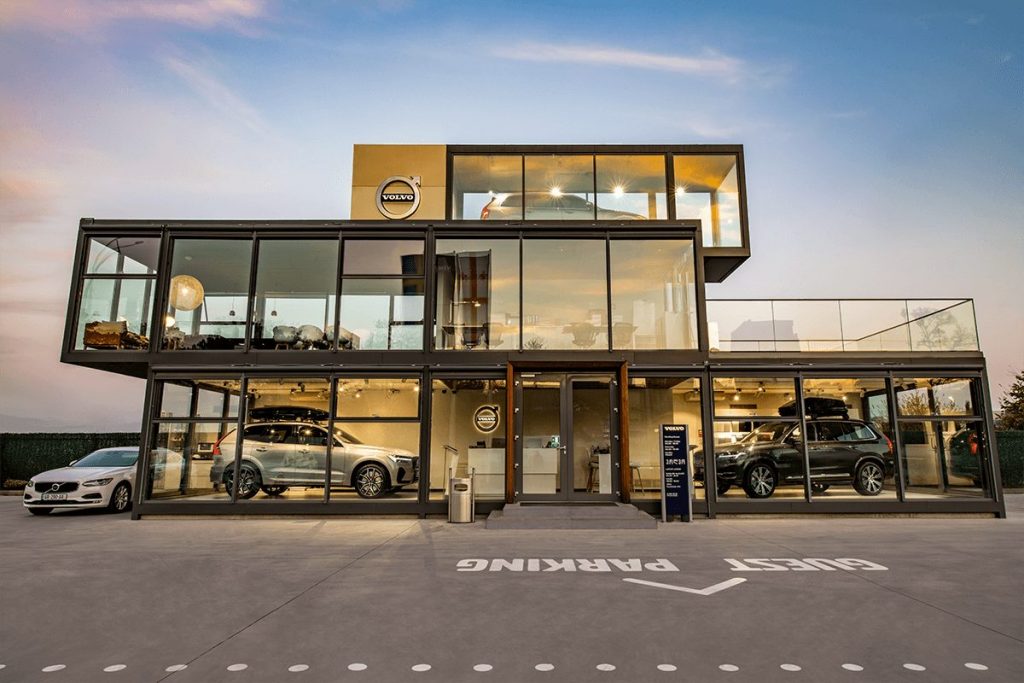Eco-friendly Business Model of Volvo Car Caucasus

Taking care of people, the planet and extending their livelihood are among the key priorities of the corporate responsibility of Volvo Cars. The company explains that the environment and ecology are not less important to them than safety.
As the automotive industry has a huge impact on the environment, it is a part of the corporate sustainability strategy of Volvo Cars that all factories of the company use recycled energy. The goal of Volvo Cars is for half of all new cars produced in 2025 to be rechargeable hybrids while the other half to be fully electric. The company is also planning to only produce electric cars by 2030.
Volvo Cars state that the supply chain of the company incorporates caring for the environment at every stage: efforts to reduce adverse impact start at the offices, continue within the factory and end in vehicles.
In addition, the company assumes a commitment to management of waste in terms of processing tires, batteries and oils. A part of corporate responsibility of Volvo Cars is to create a harmonious environment within the company, to the maintain gender equality principle and to promote various project in the field of culture.

CEO of Volvo Car Caucasus, Gaga Kokhreidze talks about the corporate sustainability strategy of the company.
Volvo is a Swedish company and like most Swedish brands, to Volvo, corporate sustainability is the main driver of its operations and the company strategy. Can you tell us about the activities of Volvo and Volvo Car Caucasus?
Volvo Car Caucasus is the subsidiary of Tegeta Holding and the official importer of Volvo Cars in the Caucasus and Central Asia. The company has been operating on the market since 2019 and it currently has four showrooms in the region – in Tbilisi, Tashkent, Yerevan and Baku.
As with road safety, sustainable development is very important to Volvo. Currently, all factories of Volvo Cars have been using renewable energy. The goal of Volvo Cars is for half of all new cars produced in 2025 to be rechargeable hybrids while for the other half to be fully electric.
In the longer-term prospect, by 2030, the brand is planning to only produce electric cars. This will be a great step forward towards the main goal of Volvo – to become an entirely eco-friendly car manufacturer.
Volvo Cars understands that the automotive industry has a great impact on the environment, which is why the Swedish manufacturer is trying to be the most sustainable brand for which the environment is equally important as safety.
“Our ambitions are focused on people, safety and sustainability” – the company goals state. What is done to reduce the adverse impact on the environment and what is your corporate responsibility in this direction? Which sustainable development goals does the company aim to achieve?
At Volvo the entire supply chain is based on caring for the environment. Efforts to reduce the adverse impact starts at offices, continues at factories and ends in vehicles.
All dealers of the Nordic brand including Volvo Car Georgia are committed to complying with the standards and the Code of Conduct of the manufacturer in which sustainable development plays a very important part.
In addition, it should be mentioned that the holding, within which Volvo Car Georgia has been operating since 2019, has its own standards. Caring for the environment as part of its corporate social responsibility is one of the priorities for the company. Our offices are plastic-free & paper free. We cooperate with respective organizations which process plastics and paper collected at our workspace.
It is particularly important to manage and process car parts and products. In this area, company Tegeta Green Planet emerged within the holding, which is responsible for the fulfillment of increased obligations of the manufacturer.
The company is committed to waste management in the direction of processing tires, batteries and oils. Useless parts will be handed over to the recycling facilities with appropriate permits for the respective activity. New products are made from separated waste which will be brought to the market again.
One of the goals of Volvo is that 50% of the cars produced by 2025 should be electric. In addition, the company is aiming to reduce the carbon footprint per vehicle by 40 %. Please tell us about these goals.
Yes, as I already mentioned, half of the cars produced by Volvo in 2025 will be electric and the other half will be hybrid. To reach this goal all new models produced by Volvo Cars will be pure electric. The world premiere of the Volvo flagship, pure electric SUV Volvo EX – 90 was on November 9 this year. Presentation of Volvo EX 90 equipped with innovative technology is the beginning of a new era.
This is the first vehicle of the brand from the new-generation of fully electrified and software-defined model series.
After Volvo EX90, the brand will present a new vehicle each year and, in this manner, it will be able to devote half of its production to electric and the other half to rechargeable hybrid models.
Volvo’s rechargeable hybrid models have a significant advantage too. In case of fully charging the electric vehicle, you can already go for 85 kilometers in this model. We can say that the rechargeable hybrids are electric vehicles with a backup plan: when 95 kilometers are over, the car will switch to the internal combustion engine.
It is also important that Volvo has long refused to use animal material in the interior of its vehicles. The Swedish brand has replaced it with the highest-quality new material “Nordico”. This is a unique material developed by Volvo Cars which is produced by processed plastic bottles, wine cork and other biomaterials.
Volvo Cars aims to only produce electric cars by 2030 and to significantly reduce its carbon footprint by 2040, thus becoming a climate-neutral company.
Corporate responsibility implies taking care of the environment as well as protecting human and labor rights and tackling corruption. What is being done in this context?
In our company, like with all authorized importers of Volvo Cars, you will find a “business Integrity” document, which all employees of our organization review and share. This is the document that also contains anti-corruption provisions, underpinning business relations. It is clearly emphasized that the partners of Volvo Cars should never become involved in any kind of corruption. They should never accept any gifts or benefits which may affect business decisions. Such as, for example, using intermediaries via third parties, contributions to political parties and so on.
In addition, all types of reports, records or invoices should be accurate and verified. One of the major directions of corporate responsibility of our company is creating an equal working environment. The members of our team know their rights well.
The company ensures safe working conditions, a maximally safe working environment (which includes identification of risks and development of response procedures to violations, taking preventive measures and precautions, training of the employees and so on). To ensure the health of the employees, the company offers health insurance, the cost of which is partially covered by the employer.
In addition, the company ensures maintenance of a work-life balance, which means creating working conditions compatible with the domestic duties of employees, their private lives and promotes gender equality at the company. Maintenance of the working policy compatible with family involves an opportunity to work from home in special circumstances. We believe that such a policy motivates our team members and prevents additional stress which is very important to the company.
Volvo is committed to promoting development of culture worldwide. Is Volvo Car Caucasus engaged in the development of Georgian culture and what projects have you implemented as part of this goal?
Since the day we first appeared in Georgia, we have been trying to promote Georgian culture and we are involved in a number of projects, for example supporting musical concerts. We have been cooperating with Stockton Records for three years and now we are already cooperating with Radio GIPA. We started a joint musical project in which Georgian and foreign performers will participate and live concerts will be covered via our and GIPA’s social media channels.
The company used the successful collaboration of Volvo Car Georgia and Nika Machaidze to present a premium-class rechargeable hybrid. As part of the campaign the musician created two new compositions and a visual concept.
Volvo included young artists in the campaign as well. Artists Irakli Kadeishvili and Zaza Chipchiuri transferred work created as an inspiration of Volvo’s rechargeable hybrid onto a wall in central Tbilisi.
What advice would you give to Georgian companies in the context of corporate responsibility and sustainability? Why is it important for them to introduce international standards and integrate sustainability issues in business strategies?
In the sustainable development report published by the UN in 2022, which includes data from 163 countries, Georgia occupies 51st place (Sweden is in third place according to the mentioned statistics) and it is with the more active participation of local as well as international organizations that we can improve the statistics. Today we have a lot of examples from the Nordic countries on how we can manage business using the “green road”. There are lots of alternatives for harming the environment less and for the business to become more successful. It should also be mentioned that each year more and more organizations appear on the Georgian market that are aimed at so-called “green goals” and give new functions to different waste.
As a rule, the outcome is always effective when several stakeholders participate in the process. I mean equal the participation of the public and private sectors. We believe that we can achieve our goals more successfully by joining efforts.
What is the role of the state in the context of the sustainability of the automotive industry, what kind of regulations are there in this sector and how can they be adjusted to the existing reality to improve the environment?
It is commendable that technical inspection of vehicles has been actively ongoing for several years. One of the major elements a vehicle is inspected for is its adverse impact on the environment.
Besides, tax clearance of electric cars is free. In addition, beneficial rates are established for hybrids and rechargeable hybrids.
The installation of infrastructure for electrified vehicles has already started. In line with the state, the private sector has been actively engaged in this process. For example, Tegeta Holding, the parent of Volvo Car Georgia, has been extending its electric charger network each year. The company has installed charging stations in almost all regions.
Please tell us about future plans and projects in terms of corporate responsibility.
We will open new showrooms in Georgia and Azerbaijan in 2023. The buildings will be built and organized in full compliance with the standards of the Nordic brand.
In addition, worth mentioning are our plans in Azerbaijan, based on which we are planning to install a solar power plant in the showroom we have there. Several major factors underpin this decision: reducing adverse environmental impact is one, as a solar plant does not emit carbon oxides. It does not harm the environment, has no radiation and is completely safe. In addition, completing the project will also significantly reduce costs of the company.
Furthermore, new office spaces will be fully equipped with recycled furniture and accessories.
The long-term plans include placement of Volvo’s charging stations for electric and hybrid vehicles in all countries of the region. We are of course sure that the share of electric and chargeable hybrids will increase significantly next year. By 2030 we will be fully electrified.




 Search
Search





